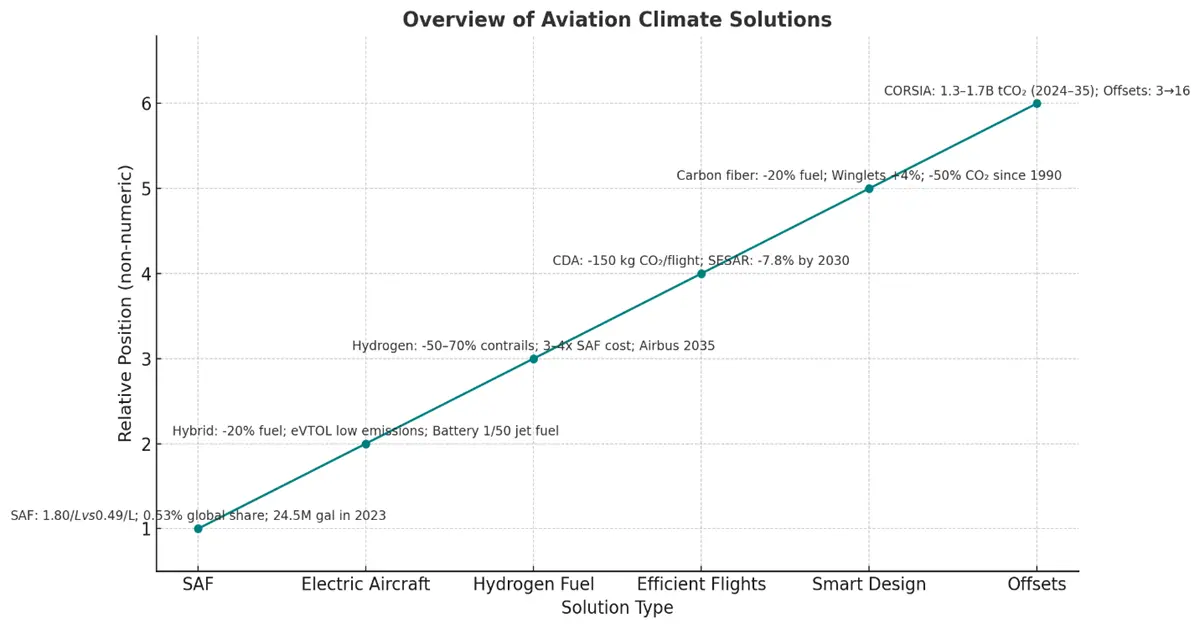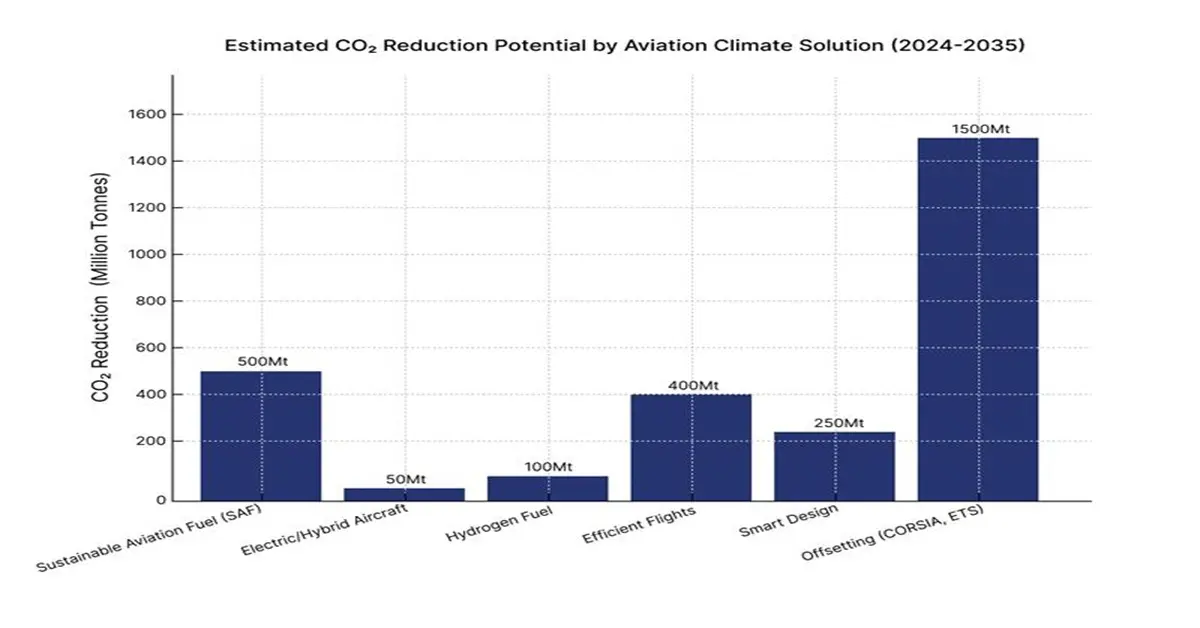Posted Date : 18 September 2025
Posted by : Sanya Mehra
As the world intensifies efforts to reach net-zero emissions, the aviation sector stands out as one of the most difficult industries to decarbonize. Contributing roughly 2-3% of global carbon dioxide emissions, aviation plays a crucial role in global transportation, trade, and tourism; however, it also leaves a substantial environmental footprint. With air travel expected to keep growing, the pressure is on to make aviation cleaner without sacrificing global mobility. This article looks at the practical steps, emerging technologies, and cooperative efforts that are shaping the aviation industry’s transition toward a more sustainable future.
Confronting the Carbon Challenge in Aviation: A Deeper Look
Reducing carbon emissions in aviation is not as easy as it might be for other sectors. The primary reasons are as follows:
- Aircraft require energy-rich fuels to cover longer distances efficiently, something batteries and low-density alternatives can’t provide currently.
- Planes are made to last decades, so upgrading entire fleets takes a long time.
- Non-carbon emissions, such as nitrogen oxides (NOx) and condensation trails (contrails), also have a warming effect on the environment.
While sectors such as ground transport can move to electricity relatively quickly, aviation doesn’t have the luxury of simple solutions. Aviation needs a multi-pronged approach, incorporating fuel innovation, engine efficiency, infrastructure transformation, and policy reform.
Below is a graph of the leading innovations and strategies being explored to decarbonize aviation:

Source: U.S. DOE, NREL, FAA
The Path to Net-Zero: Six Key Approaches
1. Sustainable Aviation Fuel (SAF)
One of the most promising solutions for lowering emissions in the coming years is sustainable aviation fuel. SAF is formed from renewable resources such as waste oils, agricultural byproducts, algae, and household waste. These fuels can lower overall emissions by up to 80% over the aircraft's lifecycle as compared to fossil-based jet fuel.
A main advantage of SAF is that it can be used in today’s advanced aircraft and engines without any modifications, making it an immediate fix. Airlines don’t need to wait for new planes or engines to start seeing environmental benefits.
However, scaling SAF faces challenges, as it accounted for only 0.53% of global jet fuel use in 2024. Production costs remain high, with SAF costing approximately $1.80 per liter compared to $0.49 per liter for conventional jet fuel. To help bridge the gap, many airlines and airports are investing in SAF growth. For instance, United Airlines is supporting startups such as Fulcrum BioEnergy that emphasize manufacturing SAF at a commercial level. For instance, the ReFuelEU Aviation Regulation mandates a minimum SAF supply in Europe, starting at 2% in 2025 and increasing to 70% by 2050, driving further adoption. Globally, over 360,000 commercial flights have used SAF across 46 airports, primarily in the United States and Europe, with U.S. consumption reaching 24.5 million gallons in 2023.
2. Electric and Hybrid-Electric Aircraft
Electric and hybrid-electric airplanes indicate a drastic shift in aviation, mainly for short-haul and regional routes. While current battery technology is not yet ideal for long-haul travel due to energy density limitations, electric propulsion holds immense promise for flights under 500 kilometers. These aircraft provide a number of environmental and economic advantages, including zero direct emissions, quieter operations, and reduced maintenance due to fewer moving parts in electric motors.
A notable example is Eviation’s Alice, a fully electric commuter aircraft made to carry nine passengers. Meanwhile, companies like Rolls-Royce and Airbus are working on hybrid systems that combine electric motors with conventional engines, reducing fuel consumption by up to 20% per trip. That said, batteries still fall short in terms of energy density. Jet fuel packs about 50 times more energy per kilogram than lithium-ion batteries, which restricts electric aircraft’s range and payload. Even so, continuous advancements in battery technology could make electric regional flights commercially viable by the early 2030s.
3. Hydrogen as Aviation Fuel in Flight
Hydrogen is coming up as another exciting possibility, primarily for medium- and long-range airline routes. It is lightweight, highly energy-dense, and produces no direct carbon emissions when used in fuel cells. Hydrogen can either be burned in jet engines or converted into electricity using fuel cells to power electric motors. The appeal of hydrogen depends on its sustainable output, mainly water vapor, and its potential to reduce dependence on fossil fuels. Manufacturers are moving forward in adopting hydrogen-powered aircraft. Airbus, for instance, has launched three concept aircraft under its ZEROe initiative, each targeting different hydrogen-powered propulsion methods. Their goal is to have a hydrogen-powered passenger aircraft in the skies by 2035.
4. Building Flights Highly Efficient
Optimizing flight operations and air traffic management can significantly reduce fuel consumption and emissions without requiring new aircraft or fuels. One key approach is the use of Continuous Descent Approaches (CDAs), which allow aircraft to descend more smoothly rather than in a series of steps, saving at least 150 kg of CO2 per flight and reducing noise pollution. In addition, modern systems using AI and real-time weather data can help pilots choose more efficient flight routes and avoid areas of turbulence or congestion. A prime example of such reform is the Single European Sky (SES) program, which plans to unify and streamline air traffic across Europe. The program can cut flight emissions by 10% by optimizing routes and reducing delays, without any change in aircraft or fuel. Additionally, SESAR projects, including Free Route Airspace and Continuous Climb Operations, contribute to an average fuel burn reduction of 7.8% by 2030, 9.5% by 2040, and 11.6% by 2050 per flight.
5. Lighter, Smarter Aircraft Designs
One of the most straightforward ways to cut fuel use is to reduce the weight of the aircraft. The lighter the plane, the less fuel it needs to stay in the air. Manufacturers are increasingly using advanced materials and smart design features to make planes more efficient.
Modern airliners such as the Boeing 787 Dreamliner and Airbus A350 make high use of carbon-fiber composites, which are both strong and lightweight. These materials enable to lower overall fuel consumption by up to 20%. Aerodynamic improvements, such as winglets and sharklets, also reduce drag and improve fuel efficiency. Innovations such as 3D printing are now being used to create aircraft components that are lighter, more complex, and more precise than ever before. These improvements not only help to reduce emissions but also make the manufacturing process more sustainable.
6. Offsetting Emissions with Market-Based Approaches
While the industry transitions to cleaner technology, many airlines are depending on carbon offsetting to control their emissions. By offsetting, they invest in green initiatives such as renewable energy farms, forest conservation, or carbon trapping facilities, that remove or avoid an equal amount of CO₂ elsewhere. An important initiative in this space is the Carbon Offsetting and Reduction Scheme for International Aviation (CORSIA), run by the International Civil Aviation Organization (ICAO). ORSIA is expected to achieve 1.3–1.7 billion tonnes of CO₂ reductions between 2024 and 2035. Offset credit costs vary, averaging $3.08 per tCO₂e in 2021, with projections of $14–16 per tonne by 2027. Offsetting is an efficient short-term tool to evade excessive pollution. Critics argue that it doesn’t help in direct emission reductions and may not always deliver the environmental benefits promised. That’s why it must be seen as part of a broader strategy that includes investing in long-term change.

Policy, Partnerships, and Investments: Drivers for Change
No single company can decarbonize aviation alone. Achieving net-zero needs a global chain of collaboration, including:
|
Stakeholder |
Role/Action |
|
Governments |
Planning emissions targets, funding R&D, and subsidizing SAF production |
|
Airlines and Manufacturers |
Investing in cleaner technologies, transparent emissions reporting |
|
Investors and Innovators |
Supporting climate-tech startups in aviation |
|
Consumers |
Preferring greener aviation options, supporting carbon offset programs |
Conclusion: The Takeoff to Sustainable Aviation
Decarbonizing aviation is one of the most complicated challenges in the climate fight, but also one of the most important. The solutions are taking shape; from sustainable fuels and electric propulsion to hydrogen innovation and smarter flight operations. While there is no one-size-fits-all answer, the convergence of these technologies, supported by worldwide collaboration and smart policies, offers a flight path toward cleaner skies. As passengers, policymakers, and industry leaders, we all have a seat on this journey. And the future of aviation, if we chart it right, can be as sustainable as it is skyward.
Contact Us







